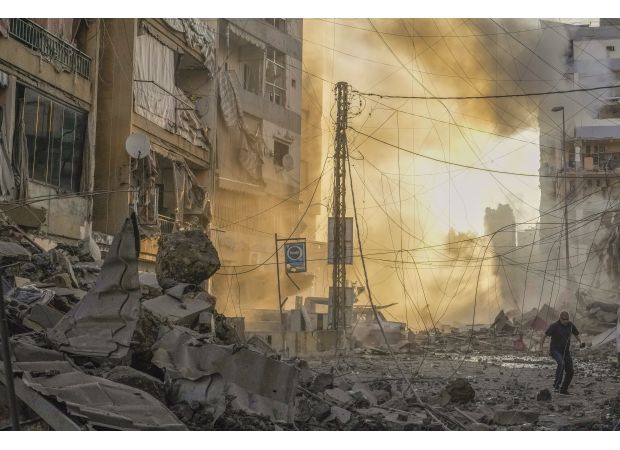Israel's bombings in Beirut cause major destruction and block a critical passageway to Syria.
Israel launched airstrikes, hitting areas near Beirut and blocking the main border crossing between Lebanon and Syria, affecting thousands fleeing bombardment.

Overnight, Israel launched a series of massive airstrikes, targeting suburbs of Beirut and disrupting the main border crossing between Lebanon and Syria. This caused major disruption for tens of thousands of people who were trying to flee the ongoing Israeli bombardment.
The airstrikes in Beirut's southern suburbs were so powerful that they sent huge plumes of smoke and flames into the night sky, and the impact could be felt for kilometers in the Lebanese capital. As of now, there is no information available on casualties, and the Israeli military has not commented on their intended target.
According to Lebanon's state-run National News Agency, there were more than 10 consecutive airstrikes in the area. Meanwhile, Israel's military reported that Hezbollah had launched about 100 rockets into Israel on Friday, as the fighting between the two sides continued.
In a statement, the Israeli military also revealed that their strike in Beirut the day before had killed Mohammed Rashid Skafi, the head of Hezbollah's communications division. Skafi had been a key member of the militant group since 2000 and was closely affiliated with high-ranking Hezbollah officials.
The strike along the Lebanon-Syria border, about 50 kilometers east of Beirut, resulted in the closure of the road near the busy Masnaa Border Crossing. Israel claimed that this crossing was being used by Hezbollah to transport weapons from Iran and other proxies into Lebanon. They said that their fighter jets had targeted a tunnel that was being used for this purpose.
Hezbollah is known to receive a significant amount of its weaponry from Iran through Syria. The group has a presence on both sides of the border and has been actively fighting alongside Syrian President Bashar Assad's forces. Footage from the Associated Press showed two massive craters on either side of the road, making it impossible for cars to pass through. People were seen crossing on foot, carrying their belongings as they fled from the war-torn area.
In the past two weeks, tens of thousands of people have fled from Lebanon to Syria to escape the violence. This new wave of airstrikes came after Israel's warning to evacuate communities in southern Lebanon, including areas beyond the United Nations-declared buffer zone, which was established after the 2006 war between Israel and Hezbollah.
Israel has been engaged in a ground incursion into Lebanon since Tuesday, with clashes between their forces and Hezbollah militants taking place along the border. Prior to the incursion, several attacks had already killed key members of the group, including their leader, Hassan Nasrallah.
On Friday, Iran's Foreign Minister Abbas Araghchi arrived in Beirut for meetings with Lebanese officials. He warned that if Israel were to carry out an attack on Iran, Tehran would retaliate in a severe manner. This visit came just three days after Iran launched over 180 missiles into Israel, escalating tensions in the region.
Iran is known to be Hezbollah's main supporter and has provided the group with weapons and financial aid over the years. In the Iranian capital of Tehran, Supreme Leader Ayatollah Ali Khamenei led Friday prayers and praised the recent missile strike on Israel. He also stated that Iran was prepared to launch more attacks if necessary.
The strike at the main border crossing was the first time it had been cut off since the beginning of the war. According to Lebanese General Security, over 250,000 Syrian citizens and 82,000 Lebanese citizens had crossed into Syrian territory between September 23 and September 30. While most of the border crossings remain open, Lebanon's Minister of Public Works assured that they are all under the supervision of the state.
The ongoing conflict between Israel and Hezbollah has resulted in almost daily exchanges of fire along Lebanon's southern border since Hamas launched a cross-border attack in October 2023, killing 1200 Israelis and taking 250 others hostage.
In a separate incident, the Israeli army coordinated with the Shin Bet internal security service to carry out a strike in the militant stronghold of Tulkarem in the occupied West Bank. The Palestinian Health Ministry reported that 18 people were killed in the attack on a refugee camp.
Violence has been rampant across the Israeli-occupied territory since the Israel-Hamas war broke out in October 2023. Northern cities, including Tulkarem, have been heavily impacted by the ongoing violence. Israel declared war on Hamas in response to their attack, resulting in the deaths of over 41,000 Palestinians, with over half being women and children. In Lebanon, nearly 2000 people have been killed, most of them since September 23.
On Friday, Israel's military reported that militants in Gaza had fired two rockets into Israeli territory, marking the first rocket fire from Gaza in about a month. They stated that one of the rockets was intercepted by the Iron Dome missile defense system, while the other landed in an open area near a kibbutz near the border. The number of rockets being fired into Israel from Gaza has significantly decreased since the start of the war.






